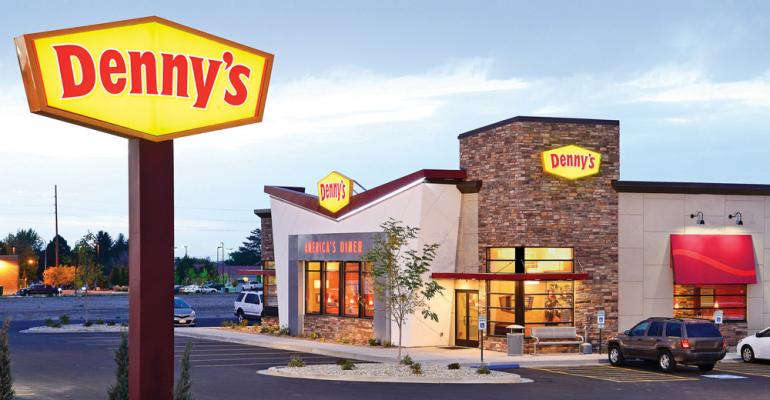Denny’s Corp. found off-premises demand in both its base brand and its two new virtual offerings helped boost systemwide sales in the second quarter, executives said Tuesday.
The Spartanburg, S.C.-based full-service brand’s same-store sales surpassed pre-pandemic 2019 levels in June and July, the company said in releasing its second-quarter earnings.
“With all operating dining rooms open, off-premises sales, inclusive of virtual brands, have remained strong at approximately 24% of total sales compared to 12% pre-pandemic,” Denny’s reported.
John Miller, Denny’s CEO, said in an earning call that he was “even more encouraged by the stickiness of our Denny's base brand off-premises business, which has grown from its pre-pandemic trend of 12% to over 20% during the second quarter.”
Convenience will remain a consumer focus as the full-service brand emerges in the vaccine era, Miller added.
“We believe guests will continue to expect technology to bring enhanced value to their dining experience whether in our restaurants or through off-premises options like our well-established Denny's on Demand platform, and that of our two new virtual brands,” he said.
Denny’s first virtual brand, The Burger Den, was introduced earlier this year and is live in more than 1,100 locations, he said, and “allows us to focus on one of our strengths, great burgers, with new varieties using ingredients that are already in the pantry.”
The second virtual brand, The Melt Down, was introduced as a DoorDash-exclusive brand that features sandwich melts.
“While this brand can utilize approximately 70% of the items currently in our pantry, our innovative culinary teams have crafted new craveable products with the addition of some new premium ingredients,” Miller said.
Denny’s is seeing an incremental 3% of average weekly sales in the two new virtual brands.
“We're very pleased the positive sales momentum continued in July, with preliminary domestic systemwide same-store sales 2.7% above 2019 levels, including 2.4% at domestic franchise locations and 6% at company locations,” Miller said.
Robert Verostek, Denny’s chief financial officer, said the virtual brands draw incremental transactions and leverage underutilized labor to maximize kitchen efficiency.
“Approximately 70% of transactions from The Burger Den and approximately 60% of the transactions from The Melt Down occurred during the dinner and late-night dayparts compared to approximately 35% of transactions for the Denny's base brand,” Verostek explained. “Not only are we leveraging underutilized dayparts, but both virtual brands over-indexed during the weekdays compared to the Denny's base brand providing additional opportunities to leverage underutilized labor.”
About 75% of transactions from the virtual brands occurred during the weekdays compared to about 65% for the Denny's base brand, he said, and the average check is similar to Denny’s off-premises transactions.
“As dining rooms have reopened and initial priority given to new brands on third-party platforms has moderated, these locations are generating average weekly sales per restaurant of approximately $600,” he said. “Nearly 700 locations are live with The Melt Down and are generating approximately $1,200 in average weekly sales per restaurant.”
Those virtual-brand transactions over-index in the dinner and late-night periods compared to Denny's base brand, he said, and “the margins range from the mid-20s to below 30% after considering product cost, delivery fees and labor efficiencies.”
Staffing remains a pressure for Denny’s in the near-term, Miller added. The company in late June launched a hiring tour by bus that drew 13,000 applications for jobs, compared to a goal of 20,000.
Miller said he staffing challenges have impacted the brand’s “ability to execute at our highest potential, especially during our late-night daypart.” He added that he expected those labor pressures to ease later in the year.
For the second quarter ended June 30, Denny’s narrowed its loss to $828,000, or 1 cent a share, from $23 million, or 41 cents a share, in the same period last year. Revenues increased to $106.2 million from $40.2 million in the prior-year quarter.
Domestic systemwide same-store sales decreased 1.2% compared to the equivalent fiscal period in 2019, including a 1.5% decline at domestic franchised restaurants and a 1.9% increase at company-owned restaurants. Domestic systemwide same-store sales increased 117% compared to the equivalent fiscal period in 2020.
Sales levels in June and July surpassed those in 2019 at both company and domestic franchise restaurants, the company said.
Denny's owns and franchises 1,645 restaurants, including 149 abroad.
Contact Ron Ruggless at [email protected]
Follow him on Twitter: @RonRuggless





